
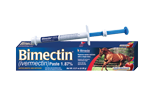
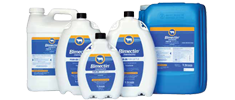










What Is Liver Fluke?
Liver Fluke (Fascioliasis) is caused by a specific flatworm, known as Fasciola hepatica. This parasite has a complicated life cycle that typically takes from 9-20 weeks to progress from beginning to end. Immature stages of the liver fluke are also able to survive in a cyst-like structure, similar to Dictyocaulus. The encysted fluke can survive in this state for up to 2 years, particularly over mild winters. This has knock-on effects for control measures as it means that once fluke is established, control programmes must be followed year-in, year-out.
Liver fluke levels have been rising consistently in the UKIreland over recent years and farms on all types of land -including those on traditionally drier land - must now ensure fluke surveillance and control strategies are in place. The mild weather of recent winters coupled with the high rainfall in some recent summers has being ideal for high fluke and snail levels, and many abattoirs are reporting a trend of increasing liver condemnation.
What Is The Impact of Liver Fluke? If My Cattle Don’t Have Obvious Symptoms, Are They Fluke Free?
Even if your stock do not display obvious, clinical symptoms such as bottle –jaw, diarrhoea and weight loss, this does not mean your stock are fluke free.
Sub-clinical fluke in cattle causes reduced profitability due to lack of thrive, reduced food conversion efficacy, lowered fertility, increased susceptibility to other infections and reduced milk yield so it is important not to assume that your cattle are fluke-free.
How Big Is The Problem?
As a result of the extremely negative impacts on animal wellbeing and performance, liver fluke is a major economic issue for many UK cattle farmers. Inevitably issues such as impaired milk production, reduced weight gain and lowered fertility translate into serious costs for the farmer, and a 2003 study estimated that liver fluke costs the UK cattle industry £300 million each year.1 The same study estimated that fluke affects 377 cattle per 1,000 head. What’s more, UK experts predict that fluke infections will reach unprecedented levels within the next 60 years. With such sobering figures in mind, it is unsurprising that the effective control of liver fluke remains a top priority for farmers and animal health professionals in the UK.
As a result of the extremely negative impacts on animal wellbeing and performance, liver fluke is a major economic issue for many Irish cattle farmers. Inevitably issues such as impaired milk production, reduced weight gain and lowered fertility translate into serious costs for the farmer. The Animal Health Ireland Report, ‘Liver Fluke - The Facts’, noted that annually, liver fluke, ‘is estimated to cost at least €90 million to the Irish Industry’. The report also noted that, ‘liver fluke may cause a reduced meat production of up to 20% in cattle…and a reduction of up to 8% in cows’. What’s more, some experts predict that fluke infections will reach unprecedented levels within the next 60 years. With such sobering figures in mind, it is unsurprising that the effective control of liver fluke remains a top priority for farmers and animal health professionals in Ireland.
The Liver Fluke Life Cycle
The diagram below highlights the life cycle of the liver fluke.
The key stages in the life cycle of the liver fluke are:
1. R Bennett et al, Economic Assessment of Livestock Diseases in Great Britain, 2003
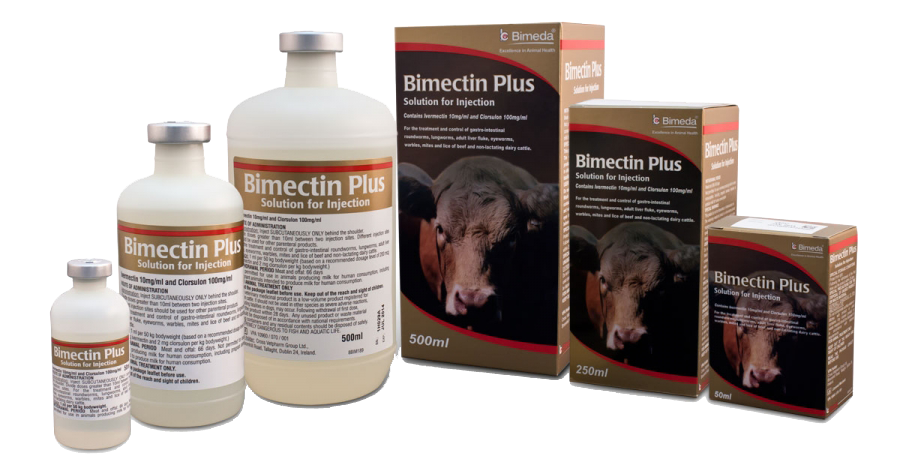
Bimectin Plus is an ideal choice for broad spectrum control of internal and external parasites in cattle. This 3-in-1 injection for chronic fluke, worms and lice contains the potent anthelmintics Ivermectin (10mg./ml) and Clorsulon (100mg/ml) and offers convenience, value for money and efficacy. The clorsulon component has been shown to be over 99% effective against adult fluke, making Bimectin Plus a popular choice for the UK’s cattle farmers.
The product may also be used as an aid in the control of biting lice (Damalinia bovis) and the mange mite Chorioptes bovis, but complete elimination may not occur.
Lungworms, stomach worms and liver fluke can all have a devastating economic effect on the cattle herd. Bimectin Plus can help you to control all three parasites. Bimectin Plus contains Ivermectin and Clorsulon, two potent anthelmintics. Clorsulon is a potent flukicide, causing adult liver fluke to become unable to metabolise sugar and to die of starvation. This powerful combination allows you to control adult liver fluke, stomach worms and lungworm in one injection.
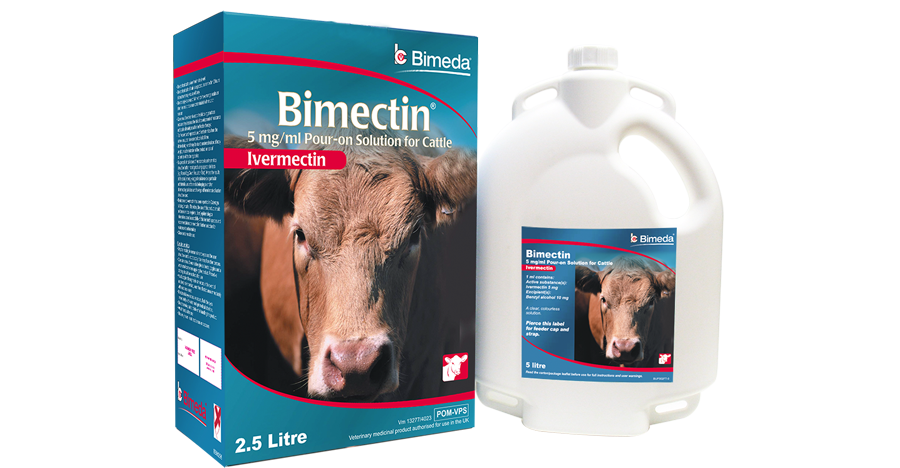
Bimectin 0.5% Pour-On Solution for Cattle delivers excellent control against a wide range of external and internal parasites. The convenient pour on solution allows for ease of application and reduced stress to both the animal and the user. Bimectin Pour-On is well tolerated by breeding animals and its effective 5mg/ml Ivermectin formulation penetrates quickly to reach and kill parasites.
Bimectin Pour-On solution is licensed for the treatment of infections with gastro-intestinal worms, lungworm (adult and fourth stage larvae), warbles (parasitic stages), mange mites and sucking and biting lice.
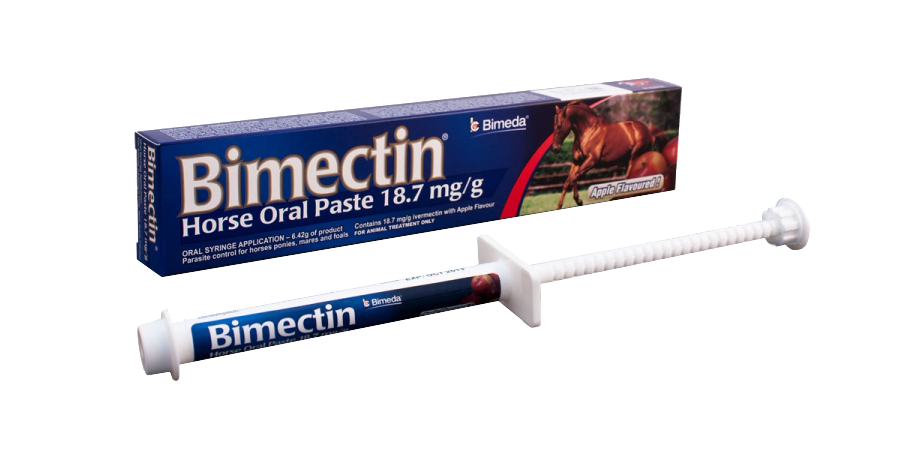
Bimectin Oral Paste with 1.87mg/g of ivemectin is an excellent option for the treatment of nematode or arthropod infestations in horses sensitive to ivermectin.
The calibrated syringe allows accurate dosing and the gel formulation facilitates absorption. What’s more, the Bimectin Paste gel formulation is apple-flavoured, for excellent palatability and ease of dosing.
The product is safe to use in horses of all ages and offers broad-spectrum activity against a wide range of debilitating and performance-depriving parasites; meaning you can have every confidence when Bimectin Paste, as part of your parasite control strategy.
Bimectin is indicated for the treatment of nematode or arthropod infestations in horses due to:
Please note, parasite resistance to any particular class of anthelmintic may develop following frequent, repeated use of an anthelmintic of that class. For more information, visit our section on Responsible Anthelmintic Use & Resistance. If you are in any doubt regarding whether use of any anthelmintic is advisable, always consult your vet or animal health advisor prior to use.
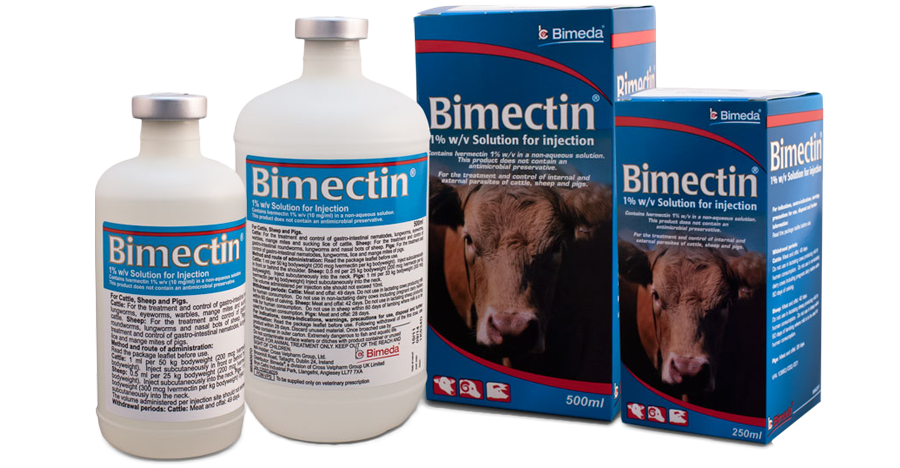
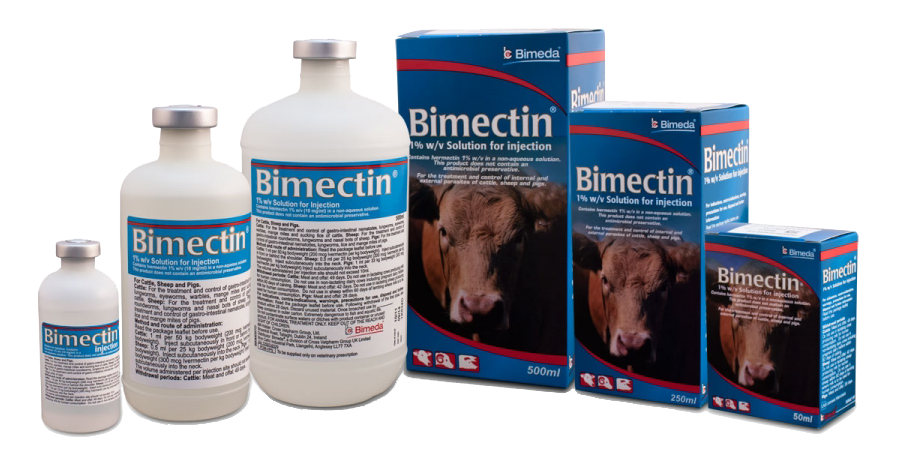

Bimectin Injection is an excellent and effective choice for the treatment and control of a wide range of internal and external parasites of cattle, sheep and pigs. Penetrating quickly to reach and kill parasites, you can be confident when using Bimectin Injection as part of your parasite control strategy.
Bimectin injection is also a highly cost-effective solution, and a single 500ml pack can treat up to 333 50-75kg ewes, up to 62 400kg cattle and up to 100 100-133kg pigs.
Bimectin Injection Is Licensed For
The Treatment & Control Of The Following Harmful Parasites:
| Cows | Sheep | Pigs |
|---|---|---|
| Gastrointestinal roundworms (adult and fourth-stage larvae): | Gastrointestinal roundworms (adult and fourth-stage larvae): | Gastrointestinal roundworms (adult and fourth-stage larvae: |
| Ostertagia spp. (including inhibited O. ostertagi) | Ostertagia circumcincta including inhibited larvae | Oesophagostomum spp. |
| Haemonchus placei | O. trifurcata | Ascaris suum |
| Trichostrongylus axei | Haemonchus contortus including inhibited larvae | Hyostrongylus rubidus |
| T. colubriformis | Trichostrongylus axei (adults) | Strongyloides ransomi (adult and somatic larval stages) |
| Cooperia spp. | T. colubriformis and T. vitrinus (adults) | Lungworms (adults): |
| Bunostomum phlebotomum | Cooperia curticei | Metastrongylus spp. |
| Oesophagostomum radiatum | Oesophagostomum columbianum | Lice: |
| Strongyloides papillosus (adult) | O. venulosum (adults) | Haematopinus suis |
| Nematodirus helvetianus (adult) | Nematodirus filicollis | Mange Mites: |
| N. spathiger (adult) | Chabertia ovina | Sarcoptes scabiei var. suis |
| Trichuris spp (adult). | Trichuris ovis (adults). | |
| Lungworms (adult and fourth-stage larvae): | Lungworms: | |
| Dictyocaulus viviparus | Dictyocaulus filaria (adult and fourth-stage larvae) | |
| Eye Worms (adult): | Protostrongylus rufescens (adults) | |
| Thelazia spp. | Nasal Bots (all larval stages) | |
| Warbles: | Oestrus ovis | |
| Hypoderma bovis, H. lineatum | ||
| Mange Mites: | ||
| Psoroptes bovis | ||
| Sarcoptes scabiei var. bovis |
Bimeda UK
Unit 2, Bryn Cefni Industrial Park, Llangefni, Anglesey, Wales LL77 7XA
Phone: +44 (0) 1248 725400
Bimectin is a global brand, delivering effective anti-parasitic treatments for cattle, sheep, pigs and horses around the world. In the UK, farmers, vets and horse owners have placed their trust in the quality Bimectin range for a number of years, and continue to do so. From pour-ons for cattle, to wormers for horses, and injections for cattle, sheep and pigs, you can be sure that the Bimectin range has the product for your needs.
What’s more, we also have excellent advice on best practice and disease control from our technical expert Rachel Mallet, Bimeda Professional Services Vet.